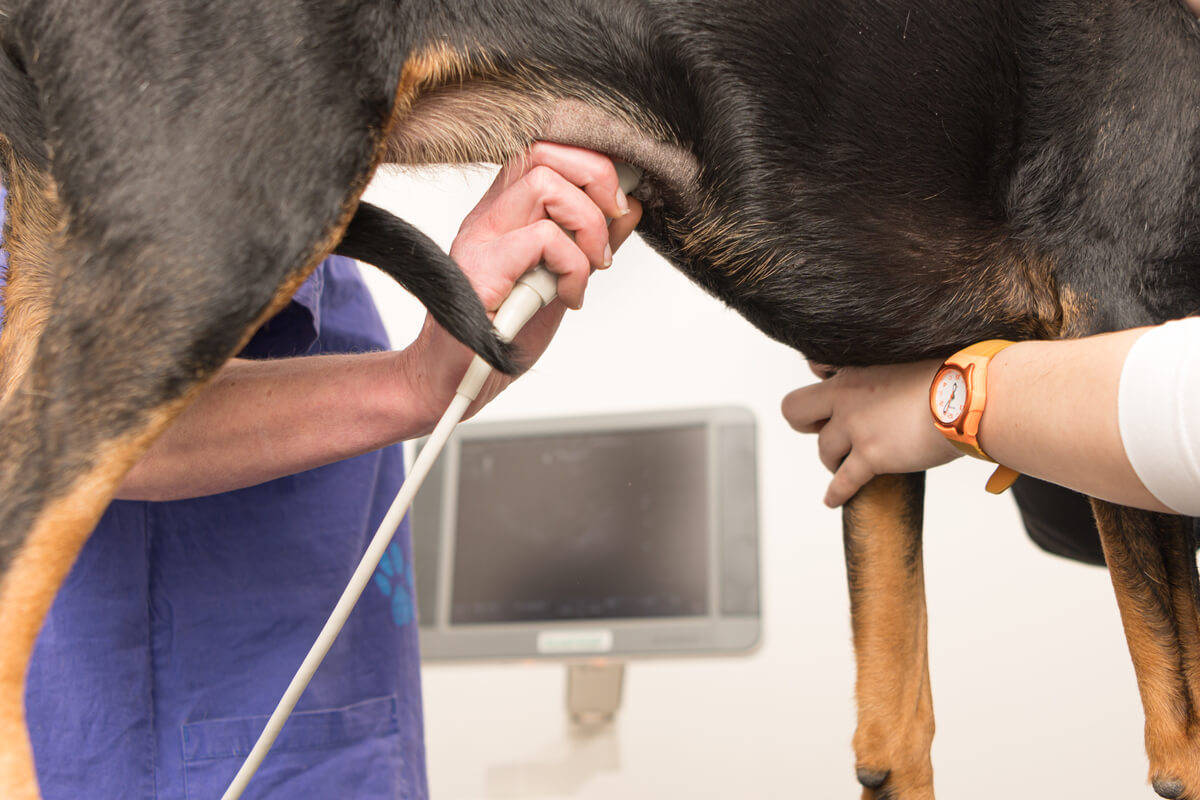Natural Remedies to Treat Colitis in Dogs

Colitis in dogs is a disease characterized by the inflammation of the colon, the part of the large intestine that absorbs the most water. When a condition occurs at this level of the digestive tract, the most characteristic symptom is usually the deposition of watery diarrhea.
If any pet has obvious signs of this problem, then it’s essential to go to the vet’s to find out the cause and administer treatment. There are also natural products and supplements that help to alleviate the symptoms, and these can be complemented with the veterinary approach.
How to identify colitis in dogs?
Diarrhea isn’t uncommon in dogs, but it usually occurs sporadically and passes naturally without clinical intervention. However, on other occasions, they may last longer and be associated with the ingestion of toxic food, parasites, obstructions, or pathologies such as colitis in dogs.
The main symptom of colitis is an increase in the frequency of stools; these are small, watery, and may appear with mucus and/or fresh blood. There’s usually no associated vomiting and, if there’s weight loss, then it’s due to the dog not eating enough, or to dehydration in cases of diarrhea.
Colitis can occur in two different ways:
- Acute colitis. This starts suddenly and doesn’t last for long. The most frequent causes are eating disorders.
- Chronic colitis: This occurs at an interval of two to three weeks, or recurrently throughout the animal’s life.

What causes colitis?
Acute colitis is the most common type, as it can appear without any symptoms other than abnormal stools in the dog. It’s usually caused by the following factors:
- Eating disorders: Due to the consumption of food that isn’t recommended for pets or sudden changes in diet.
- Food allergies or intolerances.
- Intestinal parasites, such as infections due to Trichuris, giardiasis, or coccidia. These events are common in puppies, as their immune system isn’t yet fully developed.
The causes of chronic colitis, on the other hand, can be more difficult to diagnose. Their origin is in different digestive diseases, such as inflammatory bowel disease, infections, cancer, or they can be idiopathic in origin – the real cause is never known.
Treatment of colitis in dogs
Treatment depends on the underlying reason for the colitis. In milder cases of acute colitis – which will probably resolve on their own – owners can help restore digestive health by offering a special diet recommended by the veterinarian.
On the other hand, more severe cases may require medication, and if there’s high dehydration, serum therapy.
In chronic colitis, the veterinarian will determine what’s needed to resolve the disease. For example, antibiotics, antidiarrheals, or antiparasitics for infectious causes. If necessary, interventions to remove rectal masses, polyps, or tumors – after colonoscopy and biopsy – can be considered.
In addition to all this, good dietary management is key to the treatment of colitis in dogs. The diet must be exclusively controlled, without giving the animal any other type of food or treats.
It takes at least two months or more after diagnosis for the diet to take effect in the treatment of colitis in dogs.
Some natural remedies based on these controlled diets can also help to restore proper intestinal transit. Here are some examples.
Highly digestible meats and vegetables
If the owner has a predilection for a natural diet or if the intention is to change the diet of a dog suffering from colitis, then it’s very important to pay special attention to its main ingredients.
The proteins have to be of animal origin, easily digestible, and hypoallergenic. Rabbit meat is a highly recommended source for these dogs, as well as turkey or fish.
Vegetables and fruits should also be easy to digest and rich in fiber, such as apples, pumpkins, potatoes, or carrots.
Salmon oil
Omega-3 fatty acids have anti-inflammatory properties. They’re found abundantly in fish oils, such as salmon oil, which also contains omega-6 acids. In addition, they have other very beneficial properties.
It’s easy to incorporate these supplements into your dog’s diet, as they’re sold in capsules or as oil added to their feed.
Yogurt and kefir: natural probiotics
Probiotics are beneficial in treating the symptoms of colitis-related diseases, such as irritable bowel disease, which is deficient in both bifidobacteria and lactobacilli.
These microorganisms are present in foods such as yogurt, kefir, or as nutritional supplements in pill form. Healthy intestinal flora is always one of the first steps to tackle any gastric disease.
Glutamine is beneficial for intestinal health
Glutamine is an amino acid naturally present in the body, but, with certain diseases, they can be decreased in the blood.
As a dietary supplement, this amino acid can help rebuild the intestinal lining that is affected in colitis in dogs. This promotes protein absorption and limits bacterial overgrowth.

As we’ve seen, colitis in dogs requires a combination of treatment. The best results will be seen if the owner and the veterinarian work together in order to avoid gastric discomfort in the animal.
Colitis in dogs is a disease characterized by the inflammation of the colon, the part of the large intestine that absorbs the most water. When a condition occurs at this level of the digestive tract, the most characteristic symptom is usually the deposition of watery diarrhea.
If any pet has obvious signs of this problem, then it’s essential to go to the vet’s to find out the cause and administer treatment. There are also natural products and supplements that help to alleviate the symptoms, and these can be complemented with the veterinary approach.
How to identify colitis in dogs?
Diarrhea isn’t uncommon in dogs, but it usually occurs sporadically and passes naturally without clinical intervention. However, on other occasions, they may last longer and be associated with the ingestion of toxic food, parasites, obstructions, or pathologies such as colitis in dogs.
The main symptom of colitis is an increase in the frequency of stools; these are small, watery, and may appear with mucus and/or fresh blood. There’s usually no associated vomiting and, if there’s weight loss, then it’s due to the dog not eating enough, or to dehydration in cases of diarrhea.
Colitis can occur in two different ways:
- Acute colitis. This starts suddenly and doesn’t last for long. The most frequent causes are eating disorders.
- Chronic colitis: This occurs at an interval of two to three weeks, or recurrently throughout the animal’s life.

What causes colitis?
Acute colitis is the most common type, as it can appear without any symptoms other than abnormal stools in the dog. It’s usually caused by the following factors:
- Eating disorders: Due to the consumption of food that isn’t recommended for pets or sudden changes in diet.
- Food allergies or intolerances.
- Intestinal parasites, such as infections due to Trichuris, giardiasis, or coccidia. These events are common in puppies, as their immune system isn’t yet fully developed.
The causes of chronic colitis, on the other hand, can be more difficult to diagnose. Their origin is in different digestive diseases, such as inflammatory bowel disease, infections, cancer, or they can be idiopathic in origin – the real cause is never known.
Treatment of colitis in dogs
Treatment depends on the underlying reason for the colitis. In milder cases of acute colitis – which will probably resolve on their own – owners can help restore digestive health by offering a special diet recommended by the veterinarian.
On the other hand, more severe cases may require medication, and if there’s high dehydration, serum therapy.
In chronic colitis, the veterinarian will determine what’s needed to resolve the disease. For example, antibiotics, antidiarrheals, or antiparasitics for infectious causes. If necessary, interventions to remove rectal masses, polyps, or tumors – after colonoscopy and biopsy – can be considered.
In addition to all this, good dietary management is key to the treatment of colitis in dogs. The diet must be exclusively controlled, without giving the animal any other type of food or treats.
It takes at least two months or more after diagnosis for the diet to take effect in the treatment of colitis in dogs.
Some natural remedies based on these controlled diets can also help to restore proper intestinal transit. Here are some examples.
Highly digestible meats and vegetables
If the owner has a predilection for a natural diet or if the intention is to change the diet of a dog suffering from colitis, then it’s very important to pay special attention to its main ingredients.
The proteins have to be of animal origin, easily digestible, and hypoallergenic. Rabbit meat is a highly recommended source for these dogs, as well as turkey or fish.
Vegetables and fruits should also be easy to digest and rich in fiber, such as apples, pumpkins, potatoes, or carrots.
Salmon oil
Omega-3 fatty acids have anti-inflammatory properties. They’re found abundantly in fish oils, such as salmon oil, which also contains omega-6 acids. In addition, they have other very beneficial properties.
It’s easy to incorporate these supplements into your dog’s diet, as they’re sold in capsules or as oil added to their feed.
Yogurt and kefir: natural probiotics
Probiotics are beneficial in treating the symptoms of colitis-related diseases, such as irritable bowel disease, which is deficient in both bifidobacteria and lactobacilli.
These microorganisms are present in foods such as yogurt, kefir, or as nutritional supplements in pill form. Healthy intestinal flora is always one of the first steps to tackle any gastric disease.
Glutamine is beneficial for intestinal health
Glutamine is an amino acid naturally present in the body, but, with certain diseases, they can be decreased in the blood.
As a dietary supplement, this amino acid can help rebuild the intestinal lining that is affected in colitis in dogs. This promotes protein absorption and limits bacterial overgrowth.

As we’ve seen, colitis in dogs requires a combination of treatment. The best results will be seen if the owner and the veterinarian work together in order to avoid gastric discomfort in the animal.
All cited sources were thoroughly reviewed by our team to ensure their quality, reliability, currency, and validity. The bibliography of this article was considered reliable and of academic or scientific accuracy.
- Affinity petcare. Colitis en perros síntomas, diagnóstico y tratamiento.
- Colitis linfoplasmocitaria canina: un hallazgo frecuente en la exploración colonoscópica. Rev. AVEPA, 23 (1): 13-17,2003.
- Rao, R., & Samak, G. (2012). Role of Glutamine in Protection of Intestinal Epithelial Tight Junctions. Journal of epithelial biology & pharmacology, 5(Suppl 1-M7), 47–54.
- Biourge, V., Vallet, C., Levesque, A., Sergheraert, R., Chevalier, S., & Roberton, J. L. (1998). The use of probiotics in the diet of dogs. The Journal of nutrition, 128(12), 2730S-2732S.
This text is provided for informational purposes only and does not replace consultation with a professional. If in doubt, consult your specialist.








